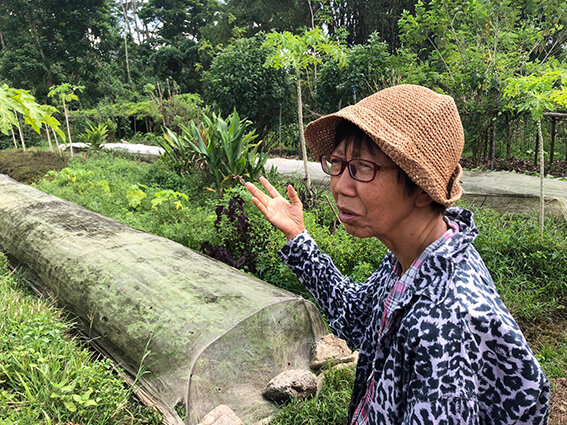Design Diplomacy: The Transmission of Autochthonous Practices & Customs
INTERNATIONAL SEMINAR SERIES
Singapore | Spain | Korea | Japan | Australia | Oman | Hawaii
This research project, constituted by a series of international embedded on-site workshops, investigates design practices and customs that exist outside of international environmental conventions in order to report on and disseminate off-the-shelf and non-speculative practices. Emphasising and brokering an expanded interdisciplinary and collaborative dialogue between experts, governmental institutions, indigenous knowledges and practitioners, and diverse communities, this research project seeks to empower civil society and especially aims to offer to the new emerging generations of practitioners in the built environment, a richer knowledge of the opportunities offered by the expanded landscape economy – a demonstration of ways of doing things differently.
Pursued through a series of workshops taking place in regions sharing global concerns through local issues, this research project is envisioned to unfold in two phases. The first taking place across the Asia Pacific (e.g. Seoul (South Korea), Coranderrk (Australia), Fukuyama (Japan), Singapore, Cameron Highland (Malaysia), Oahu (Hawaii)), and the second focusing on Europe and the Middle East (e.g. Nizwa, Muscat (Oman), Seville (Spain)). These workshops enable us to meet people in their own environment and context, as well as the various types of stakeholders disregarded by globalisation and speculation of current environmental markets. Internationally expanding the knowledge of these environmental resilience movements is both a logical continuation and an opportunity to define a multi-sectoral and transnational critical tool for the built environment community.
Alban Mannisi RMIT University & Charles Anderson, RMIT University
Design Diplomacy - Venice Biennale 2021
Research Projects








Parlamento Diplomacy
Italian Virtual Pavilion Venice Architecture Biennale Venice, Italy
May - November 2021
The rampant anthropisation of our telluric biosphere, is no longer fuelled by our ecological transformations and transitions or the quest for the absolute in the heart of unknown counterparts, but by the seemingly trivial but powerful and ongoing processes of economic extraction, speculation, and growth. In response to this, the significant resurgence of situated ecological knowledge(s) resulting from slow and cumulative maturation of environmental awareness, often denigrated by colonial powers and 20th Century autocratic engineering, reveals abysses of uncertainty.
Parlamento Diplomacy is a forum convened within the Virtual Italian Pavilion of the 17th Venice Architecture Biennale to discuss this issue and the ethical philosophy deployed through the Design Diplomacy inquiry.
Accompanied by a team of built environment practitioners and researchers encountered at the previously held Hokkien Mee and ReciprocUdad International Seminars, @ Design Diplomacy invites environmental ambassadors to present and discuss the dynamics and interests of possible in-situ investigations and actions.
Parlamento Diplomacy have the pleasure to showcase a worldwide panorama of autochthonous practices and customs revitalisation from: Australia, Brazil (South & North region), Cameroon, Japan, Netherland, Oman, Colombia, Ireland, Italy, Thailand, Panama, Belgium.
Hokkien Mee Diplomacy
SINGAPORE / MALAYSIA_Cameron Highlands
08-14 July 2019
Singapore presents itself as an ideal of cultural, political and economic diversity. The quality of life, housing and food is remarkable, yet its food production is 90% foreign and the impact of the growth of its plants is a growing ecological, spatial and ethical disaster for the region of Cameron Highlands in Malaysia.
Held in Singapore, this symposium will attempt to decipher the mechanisms of this environmental, spatial and social injustice by meeting a group of established activists and entrepreneurs in Singapore. Called Edible Garden City, this groups’ approach aims to re-centralize and densify Singapore agricultural production within its own territory. In the symposium, the RMIT Melbourne team will work with the local partners of Edible Garden City and Foodscape Collective, to explore the opportunity for Landscape Architects to ensure a better environmental justice.
The team will document the workshop, discuss the issue of environmental injustice, food insecurity and the ecological imprint on Malaysia and then visit agricultural land in the Cameron Highlands area. The creation of a film will allow the team to be closer to their interlocutors’ milieu and to delve into the complexity of the environmental problematics. Engaging with and documenting exogenous speech and visual density of information will allow us to decrypt the unsaid and make present the intangible.
Hokkien Mee Diplomacy is part of a Series of international workshops which aims to provide an overview of the current Singapore/Malaysian environmental Injustice situation; develop critical tools and methodologies of engaging in this arena; provide a systematic compendium of case studies of these complex phenomena for the enthusiastic new generation of landscape architects / planners / environmental designers concerned with the ethical behaviours towards humans and non-humans.
Partners: Edible Garden City, Singapore
Foodscape Collective, Singapore
Team: Alban MANNISI, Charles ANDERSON, Yazid NINSALAM
Project: Moving Image Capturing the Singaporean/Malaysian Design Diplomacy
Topics: Food Security, Spatial Injustice, Environmental Injustice, Urban Density, Ecological Imprint, Urban Agriculture, Post-City, Singapore, Malaysia
Outcome:
Hokkien Mee Diplomacy Forum, Architecture saving OUR world, 2020 Archifest Singapore, (Sept 25 – Oct 31, 2020)
ULU, Video, Super ꓲ Tight Exhibition [RMIT Design Hub 2019]
Mannisi, A., Anderson, C. and Ninsalam, Y. (2022) ‘Hokkien Mee Diplomacy’, Supertight, John Doyle & Graham Crist (Eds.), Actar Publishers, Barcelona



ReciprociUdad Diplomacy: Cohesive Urbanities & Societies / Cultural Landscape of Sustainable Touristic Region, Seville, Spain
SEVILLE_Spain
27-31 January 2020
At the heart of the global economic crises of the past decade that hit Europe and especially Spain, the city of Seville shines as if these torments were foreign to her. Its architectural heritage resplendent like few other European cities, its open spaces testifying to new landscape dynamic competing to blend its territorial legacy and environmental concerns; its social capital facing with profound dignity a growing tourist economy.
At the time of social cohesion improvement and the difficult maintenance of intangible cultural landscapes identities, Seville presents an intriguing example of what is now called a Sustainable City.
ReciprociUdad Seminar aims to better understand the urban and territorial policies implemented by the Andalusian region and the design / planning actions /projects undertaken/implemented in light of these policies, in order to identify the specificity and particularity of the resilience challenges and opportunities of this region in achieving a resilient city/territory
The team will observe and discuss with local and international experts, the territorial policy put in place by the region , together with the suite of projects undertaken over the last few decades though this policy initiative. Similarly, local geopolitics will be questioned to better estimate how the regional decentralization inherent in its history has allowed its region to avoid the ruin caused by the escalation of European crises.
Finally, it is since the analysis of its social capital, the capacity of its inhabitants to conjugate Iberic arts of living with the requirements of a major tourist centre that we question the suitable character of the Andalusian communalism.
ReciprociUdad Seminar is part of a Series of international workshops which aims to provide an overview of the current Seville Social Cohesion and Environmental Justice achievement; develop critical tools and methodologies of engaging in this arena; provide a systematic compendium of case studies of these complex phenomena for the enthusiastic new generation of landscape architects / planners / environmental designers concerned with the ethical behaviours towards humans and non-humans.
Partners
RMIT University, Melbourne
Architecture and Urban Design / Landscape Architecture Discipline
University of Sevilla
master universitario en ciudad y arquitectura sostenibles (mcas)
Participants
Uni Sevilla Team: Carlos Tapia (Coord.), Domingo Sánchez Fuentes, María Carrascal Pérez, Julia Rey Pérez, María Prieto Peinado, Emilio Mascort Albea, Blanca del Espino Hidalgo, Félix de la Iglesia Salgado, Daniel Navas Carrillo, Pedro Górgolas Martín, Marta Pelegrin Rodríguez, Reyes Gallegos (REAVIVA)
Keynote Speakers: Tahl Kaminer, University of Cardiff. Carlos García Vázquez, Universidad de Sevilla. De Montfort-Leicester University / Leicester Urban Observatory, Geraldine Dening. RMIT Melbourne, Alban Mannisi (Coord.), Charles Anderson, Universidad de Málaga, Jorge Minguet Medina. Universidade de São Paulo, Manoel Rodrigues Alves&Maíra C. Daitx.
Publications:
Anderson, C. (2021) ‘Reciprocal Urbanism’, in ReciprociUdad: Design Diplomacy in Seville, Carlos Tapia Martin & Alban Mannisi (Eds), Recolectores Urbanos Editorial, Plaza Ruiz Valle, Málaga, 2021. Pp 65-86.
Symposium: ReciprociUdad Diplomacy, Cohesive Urbanities & Societies, University of Seville, Spain, (27-31 January 2020).

Design Diplomacy: Seoul Pedagogy of Citizen Participation
Date: 20 June – 03 July 2020 (Canceled_New Dates TBC)
Background
The need to conduct this research has emerged from the ambivalent situation of the built environment profession around the world. The landscape architecture field has considerably evolved over the last 50 years and has experienced controversial mutations since the advent of the Sustainable Development Era (Our Common Future 1987). A whole economy of human, natural and economic capital management has emerged which is significantly affecting the environmental expert’s ability to ethically manage, design, and sustain our biospheres.
Various forms of civil resistance (Sukhdev 2012) have since warned the landscape community about the excesses of the neoliberal ecology (O Connors 1998) and reported on the fair and ethical conducts with which worldwide cultures and regions desire to ensure the future of communities through indigenous practices and customs (Nagoya Protocol 2010).
From this environmental resistance, the ‘Globalisation from the Grassroots’ phenomenon (Magnaghi 2005) was articulated. This work reports on the global insurrectional movement fighting against mechanisms of Western neoliberal speculation in order to reconsider traditional and autochthonous technologies within our contemporary practices and knowledge of ecological management. Studying the political philosophy and political ecology of these environmental phenomena in the regions was investigated through a previous workshop series (Mannisi 2012-2019). This analysed the recurrent and inherent factors of cultures and environments where they emerge.
Design Diplomacy: OMAN
Background
The need to conduct this research has emerged from the ambivalent situation of the built environment profession around the world. The landscape architecture field has considerably evolved over the last 50 years and has experienced controversial mutations since the advent of the Sustainable Development Era (Our Common Future 1987). A whole economy of human, natural and economic capital management has emerged which is significantly affecting the environmental expert’s ability to ethically manage, design, and sustain our biospheres.
Various forms of civil resistance (Sukhdev 2012) have since warned the landscape community about the excesses of the neoliberal ecology (O Connors 1998) and reported on the fair and ethical conducts with which worldwide cultures and regions desire to ensure the future of communities through indigenous practices and customs (Nagoya Protocol 2010).
From this environmental resistance, the ‘Globalisation from the Grassroots’ phenomenon (Magnaghi 2005) was articulated. This work reports on the global insurrectional movement fighting against mechanisms of Western neoliberal speculation in order to reconsider traditional and autochthonous technologies within our contemporary practices and knowledge of ecological management. Studying the political philosophy and political ecology of these environmental phenomena in the regions was investigated through a previous workshop series (Mannisi 2012-2019). This analysed the recurrent and inherent factors of cultures and environments where they emerge.







